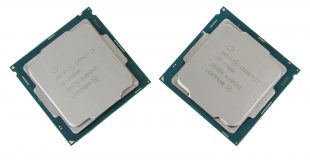
Kaby Lake is upon us. With Intel killing off its Tick-Tock product cycle in 2016, Kaby Lake ushers in the new ‘Optimisation' phase of a Process-Architecture-Optimisation strategy. What does that mean? Kaby Lake is effectively a barely tweaked version of Skylake which uses Intel's optimised 14nm+ process technology resulting in improved frequencies.
Reading between the lines, this means that significant performance improvements are not Kaby Lake's goal (spoiler: that's effectively how the performance is). What the optimised 14nm+ process node brings to the table is improved frequency performance which sees the Kaby Lake Core i7-7700K shipping as Intel's fastest out-of-the-box consumer chip. And that improved frequency ability stays when overclocking the chips past their rated speeds and voltages.
The Skylake Core i5-6600K and Core i7-6700K have generally been received well by the enthusiast market since their launch in August 2015. Aided by a feature-rich platform that offered temptation for users interested in high-speed storage and connectivity pipelines, Skylake adoption rates seemed very good, anecdotally speaking.
Kaby Lake's 3.8GHz (4.2GHz turbo) Core i5-7600K and 4.2GHz (4.4GHz turbo) Core i7-7700K basically aim to pick up where the Skylake predecessors have left off. The CPUs are joined by the new Z270 chipset which brings with it additional IO lanes and support for Intel Optane Memory but the same LGA 1151 socket is used so Skylake works with Z270 and Kaby Lake works on Z170 (with a BIOS update). Oh, and there's Intel ‘s new HD 630 iGPU under-the-hood which runs up to 1150MHz for the unlocked i5 and i7 (not that gamers or discrete GPU users will care).
So, to be brutally honest, there's little for desktop enthusiasts to get particularly excited about with Kaby Lake from a CPU perspective. The exception to that statement is a hoped increase to upper-end frequencies achievable via overclocking thanks to the optimised process technology. On the desktop side of things, this is basically a case of making the fastest architecture faster simply because the process node optimisations are there for the taking.
Note: Please ignore the pricing numbers in the above images as they are incorrect.
Core i7-7700K and Core i5-7600K represent the multiplier-unlocked launch party for Kaby Lake. There's an unlocked dual-core, hyper-threaded Core i3-7350K on the horizon but that part is unlikely to show up for another few weeks.
The 7700K and 7600K are both rated as 91W TDP parts due to their multiplier-unlocked statuses. The i7-7700K is a 4 core, 8 thread part that operates at 4.2GHz base frequency and boosts as high as 4.5GHz. Hyper-threading is not enabled with the i5-7600K, making it a 4 core, 4 thread part that runs at 3.8GHz base and 4.2GHz maximum turbo boost speed. Those boost speeds are using Turbo Boost 2.0, not 3.0 as seen on Broadwell-E CPUs. 8MB of Intel Smart Cache (L3) is used for the i7-7700K while the i5-7600K chip gets that cut down to 6MB.
Both CPUs use Intel's new up-to-1150MHz HD 630 integrated GPU which we will discuss in further detail shortly (and test). The same dual-channel DDR3L/DDR4 memory capability seen on Skylake is present with Kaby Lake but this time DDR4 frequency support is increased to 2400MHz natively.
The highlighted pricing for the 7700K and 7600K is lower than that of both Skylake predecessors; the Core i7-7700K is $305 (vs the 6700K's $350) while the Core i5-7600K is $217 (vs the 6600K's $243). Update 03/01/2017: it has come to our attention that pricing information in the above images is for 1ku tray pricing, which is not comparable to the retail pricing numbers for Skylake. Suggested retailer pricing for the Core i7-7700K is $339 and the i5-7600K is $242. The Great British Pound has depreciated significantly since Skylake's August 2015 launch so don't expect to see much difference in the pricing for Kaby Lake compared to Skylake (there'll probably be a slight increase, in fact).
We expect the i7-7700K to retail towards the £350 mark and the Core i5-7600K to sell towards £240. Update 05/01/2017: the Core i7-7700K is now available for £349.99 and the Core i5-7600K is £239.99 from Overclockers UK.
Jumping through the ages (from left to right): Devil's Canyon i7-4790K, Skylake i5-6600K & i7-6700K, Broadwell-E i7-6800K, Kaby Lake i5-7600K & i7-7700K.
Features (Core i7-7700K):
- 4.2GHz base frequency (up to 4.5GHz turbo frequency).
- Unlocked core ratio multiplier.
- BCLK overclocking capability.
- 4 cores, 8 threads.
- 8MB Intel Smart Cache.
- Dual-channel DDR4-2400MHz and DDR3L-1600MHz native memory support.
- 16 PCIe 3.0 lanes.
- Intel HD 630 GPU (up to 1150MHz).
- 91W TDP.
- LGA 1151 socket.
- $339 pricing.
Features (Core i5-7600K):
- 3.8GHz base frequency (up to 4.2GHz turbo frequency).
- Unlocked core ratio multiplier.
- BCLK overclocking capability.
- 4 cores, 4 threads.
- 6MB Intel Smart Cache.
- Dual-channel DDR4-2400MHz and DDR3L-1600MHz native memory support.
- 16 PCIe 3.0 lanes.
- Intel HD 630 GPU (up to 1150MHz).
- 91W TDP.
- LGA 1151 socket.
- $242 pricing.
 KitGuru KitGuru.net – Tech News | Hardware News | Hardware Reviews | IOS | Mobile | Gaming | Graphics Cards
KitGuru KitGuru.net – Tech News | Hardware News | Hardware Reviews | IOS | Mobile | Gaming | Graphics Cards


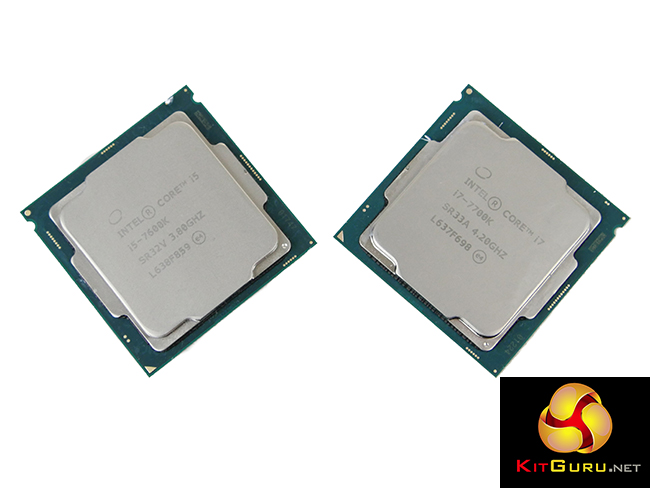
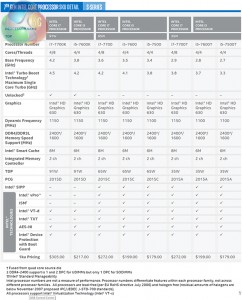
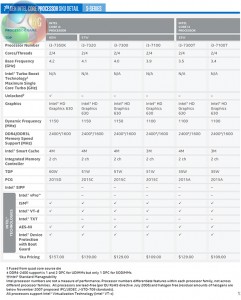
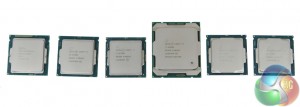
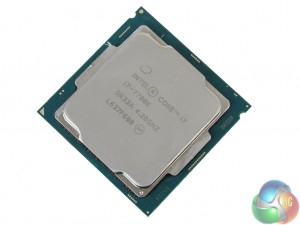
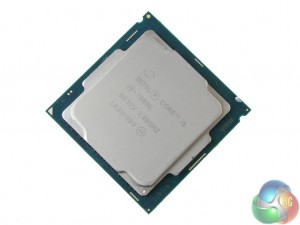

Rushed out as an answer to Zen/Ryzen. You’re stupid if you buy one of these now without seeing what AMD will offer.
No, kaby lake was announced that will be little boost from skylake, the best of intel is coming from Cannonlake
It’s barely a “little boost”. Clock for clock, benchmark results show literally 0 improvement. Only improvement is slightly better OC.
Very disappointing performance it’s almost the same with 6700k why intel bothered to release this ??
Cannonlake looks more promising
Most pointless intel release to date. The day they go back to dropping the igpu on the i5/i7 range and keep them for the i3 will be the day we actually get improvements. I would expect if they dropped a CPU with a 5.0GHz out the box speed and some decent gains whilst loosing the intergration then almost all gamers running dedicated GPU’s would take note and buy.
As it is there is zero reason to look at this and wait to see what Ryzen (release January 2017) and Cannon Lake (Late 2017) do really if you have anything in the i5/i7 4 series or above.
It may well be that Cannonlake is the answer to Ryzen, however the release of the 7700k is inline with the Ryzen release and Cannonlake will be 9-11 months later.
The though that there will be people out there who’ll upgrade from Skylake to this…..
under performing junk I will pass
Not from Cannonlake. From Ice Lake in 2019. Intel is in a bad situation right now. They have no real developments in the works until 2019. Kaby Lake up to Coffee Lake are simple increments. Kaby Lake is just a Skylake refresh with a different name, and Coffee Lake will just be Cannonlake with six cores coming to the mainstream platform; essentially, the low-tier of Cannonlake-E rebadged. Like Broadwell-E’s 6800K/6850K.
I was hoping for better I was going to finally jump from my 2600k to this gen but there is very little difference between my cpu and 6700k and it looks like there is no difference between that and this new gen.
Hey y’all, i’ve read thru your comments about the Kaby Lake 7700k and I have a request. I am FINALLY able to afford to upgrade my “gaming rig” which is an old ThinkCenter Pent Dual Core E5500 with an Nvidia GeForce GT 730, so anything will be mo betta… My question is what to buy as the heart of a new Gaming Rig? I am Network Spt specialist so I can assemble myself but im not up to date on the best gaming gear. If you could please make recommendations? I can probably spend up to $1800 that I received from my late mother’s estate. Thanks, plz dont hate, i really need your input. Peace!
Best to wait for Zen, then you can get an i7 or the equivalent AMD CPU depending on which performs better or is better value for money.
Im on the same boat buddy, tired of this deliberate turtle play from both AMD and Intel.
Thank you, since you replied I’ve watched the Zen video at https://www.youtube.com/watch?v=4DEfj2MRLtA and I am definitely going to wait for the Ryzen release. In the mean time I will research the AM4 Mobos available and try to choose one. I have long been an avid Nvidia fanatic and never once thought about using a Radeon card but I must admit I find the new AMD Vega interesting. I am looking forward to seeing the benchmarks on it and possibly purchase one for my new gaming rig.
i returned my skylake for this, it was just a few dollar more considering the return cost. I think if i wasnt in the return window though there’s no chance id spend money on upgrading.
I needed(Old one died) a new CPU that’s the only reason I got kaby lake
I like the z270’s though
http://www.dell.com/en-us/shop/productdetails/alienware-aurora-r6-desktop/dpcwxt03s?selectionState=eyJGUHJpY2UiOjE3NzkuOTksIk9DIjoiZHBjd3h0MDNzIiwiUXR5IjoxLCJNb2RzIjpbeyJJZCI6MTQ2LCJPcHRzIjpbeyJJZCI6IjcyMUpEOSIsIlByaWNlIjo0MDAuMH1dfSx7IklkIjoxMTYsIk9wdHMiOlt7IklkIjoiODUwTENPRCIsIlByaWNlIjoxNTAuMH1dfSx7IklkIjoxNiwiT3B0cyI6W3siSWQiOiJEVkRSVyIsIlByaWNlIjozMC4wfV19LHsiSWQiOjQsIk9wdHMiOlt7IklkIjoiVVNLWUJEIn1dfSx7IklkIjoxMiwiT3B0cyI6W3siSWQiOiJBTFdNU0UifV19LHsiSWQiOjU5NywiT3B0cyI6W3siSWQiOiJEVkRTVyJ9XX0seyJJZCI6NzQ5LCJPcHRzIjpbeyJJZCI6IkNJN0tCTCJ9XX1dfQ%253D%253D